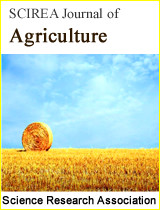A new turning movement algorithm for special road junctions
DOI: 522 Downloads 16900 Views
Author(s)
Abstract
Presented in this paper is a new algorithm based on matrix algebra for determining turning movements at special road junctions in which certain movements within the junction are prohibited. This is achieved by developing mathematical models based on continuity of flow and the fact that the number of linearly independent equations is equal to the number of unknown traffic streams. The models have practical use in reducing the number of detectors or counters needed in collecting the turning movements from each arm/link of a junction and have the advantage of reducing the time required for the analysis of traffic survey data. These models were validated against data obtained from different sites in different countries and excellent agreement was found between the calculated and actual turning movements. The paper reveals that the solution vector for each case is unique and relatively insensitive to light U-turns.
Keywords
mathematical model, road junctions, turning movements.
Cite this paper
Sabah Said Razouki, Ph.D., Dipl.-Ing., CEng., AM.ASCE, Saad Yousif, Ph.D., M.Sc. Senior Lecturer,
A new turning movement algorithm for special road junctions
, SCIREA Journal of Agriculture.
Volume 1, Issue 1, October 2016 | PP. 35-49.
References
| [ 1 ] | Adebisi, O. 1987.Improving manual counts of turning traffic volumes at road junctions, Journal of Transportation Engineering, 113(3): 256-267. |
| [ 2 ] | Al-Shaekhli,N.Y.1993.Optimization of number of observers for determining traffic movements at three-arm road junctions. M.Sc. thesis, College of Engineering, University of Baghdad. |
| [ 3 ] | Bell, M.G.H. 1984. The estimation of junction turning volumes from traffic counts: the role of prior information, Traffic Engineering and Control, May, 25(5): 279-283. |
| [ 4 ] | Currin, T.R. 2013. Introduction to traffic engineering, a manual for data collection and analysis, 2nd Edition, Cengage Learning, UK. |
| [ 5 ] | Eisenman, S.M. and List, G. 2005.A technique for data collection and estimation of turning movements at roundabouts, Proceedings of the 84th Annual Conference of the Transportation Research Board, 2005, Washington D.C. |
| [ 6 ] | Findley, D.J., Cunningham, C.M. and Hummer, J.E. 2011. Comparison of mobile and manual data collection for roadway components, Transportation Research Part C, 19: 521-540. |
| [ 7 ] | Jadaan, K. 1989. Accuracy of turning flow estimates at road junctions, Journal of Transportation Engineering, ASCE, July, 115(4): 438-449. |
| [ 8 ] | Jefferys, M. and Norman, M. 1977.On finding realistic turning flows at road junctions, Traffic Engineering and Control, January, 18(1):19-25. |
| [ 9 ] | Kreyszig, E.2006.Advanced engineering mathematics. Ninth edition, JohnWiley &Sons, Singapore. |
| [ 10 ] | Razouki, S.S. 1997. Modeling turning movements at traffically determinate four-arm road junction, Journal of Engineering and Development,Baghdad, Iraq,1(1): 62-71. |
| [ 11 ] | Razouki, S.S. 2000.A mathematical model for determining the origin-destination matrix for five-arm rotaries.Journal of Engineering and Development,Baghdad, 4(3): 86-99. |
| [ 12 ] | Razouki, S.S. and Jadaan, K.S. 1997.Estimation of turning movements at three-arm rotaries.Dirasat, An International refereed research Journal, Natural and Engineering Sciences, 24(2): 305-312. |
| [ 13 ] | Razouki, S.S. and Sayigh, R.A.2002. No observer approach for determining turning movements at traffically determinate road crossings. Al-Muhandis 149(1):3-15. |
| [ 14 ] | Van Zuylen HJ 1979. The estimation of turning flows on a junction. Traffic Engineering and Control, 20(11): 539-541. |
| [ 15 ] | Wylie,C.R.and Barrett, L.C. 1985.Advanced engineering mathematics. Fifth edition, McGraw-Hill Book Company, London. |
| [ 16 ] | Yousif, S.Y. and Razouki, S.S.2007. Validation of a mathematical model to estimate turning movements at roundabouts using field data. UTSG, Leeds, UK. |
| [ 17 ] | Zheng, P. and McDonald, M. 2012.An investigation on the manual traffic count accuracy. 8th International Conference on Traffic and Transportation Studies, Procedia – Social and Behavioral Sciences, 43: 226-231. |

